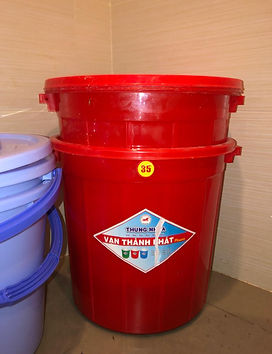Bokashi Composting: The Basics
Introduction
The Japanese term “Bokashi”, is a process that converts fresh food waste into soil amendments. Food scraps gradually ferment with Bokashi bran, which is a refuse material (ie. bran, rice hulls, sawdust) that has been inoculated with effective microorganisms (EM.)
Although we have dedicated an entire section on our journey with Bokashi composting, here is a “crash course” on how to Bokashi compost!
What You Need
1. A composting bin (store-bought or DIY.) The bin must:
-
Be able to hold as much compost as you intend to develop.
-
This is for practicality reasons (so you don’t have to transfer the compost to another container if your add to your pile.) For reference, I used a 35L bucket for my 40 lb compost pile.
-
-
Have a tightly fitted lid (preferably air-tight.)
-
Since Bokashi composting is an anaerobic process, the less oxygen your compost pile is exposed to, the better.
-
This will also prevent insects from entering your compost pile.
-
2. Bokashi bran - A fine substance that has been inoculated with Effective Microorganisms, or EM (store-bought or DIY.)
-
This is essential to develop a Bokashi compost pile. The composting process takes place when your food waste ferments.
3. Kitchen scraps
-
This can range from meat to dairy, to oil. According to multiple sources, as long as your food waste is fresh and cut up, any food scrap can be composted via the Bokashi method!

How To Prepare Your Bokashi Bucket
1. Cut out a piece of cloth to line the bottom of your bucket with. Then add a first layer of bokashi bran into your composting bucket.


2. Add an even layer of fresh food scraps. Then add another layer of bran. Repeat the process of adding layers of more bran, then more food scraps again. After filling your bucket up with food waste, sprinkle a final and generous layer of bran on top.



4. Seal the pile with another piece of cloth and gently push the pile down. Cover the bucket with its lid. Store in a warm environment where your EM can get to work!


5. Let your bucket process for at least two weeks. In theory, if the liquid content in the bucket is drained regularly, you can keep your scraps in the bucket for up to about a year.
How To Bury Your Bokashi Pile
1. Bury the Bokashi pile in a trench or yard. One way to do this is to dig a large hole (about 3 feet long and 10 inches deep.)

2. Spread your Bokashi content along the hole (I recommend using a scooping tool.)

3. Rinse the bucket and dump the water into the hole as well (to ensure the EM are with the pre-composted materials.) Spread the content out evenly inside the hole.


4. Add soil back to the hole and cover the Bokashi pre-compost.
And now we wait! The process of breaking down in the soil can take between a few weeks, to a few months. This depends on the factors carried out in earlier steps or your environment.


Want to see us go into detail about Bokashi composting? Click here to see how I created my own Bokashi bran and the process of how I developed my own Bokashi compost pile.
Sources Used
https://thecompostess.com/2015/04/22/how-to-make-bokashi/
https://www.epicgardening.com/bokashi-compost-buckets/
https://www.youtube.com/watch?v=0k3PTUnDHSI&t=476s